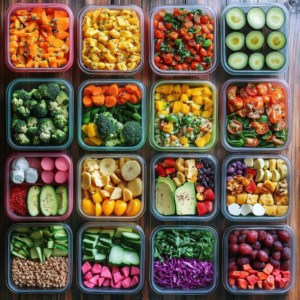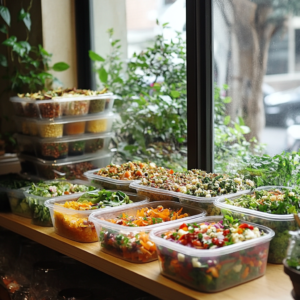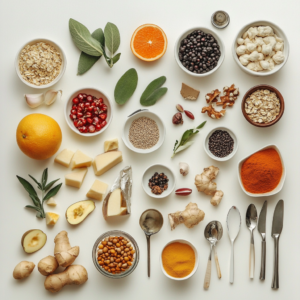Introduction
Hello, fellow health enthusiasts! I’m excited to share how vegan meal prep ideas can completely transform your busy week into an organized, stress-free, and nutritious experience. By dedicating time each week to planning and preparing your meals, you not only save precious time and reduce daily cooking stress but also ensure that your plant-based diet remains balanced and wholesome. Over the years, I have discovered that integrating thoughtful vegan meal prep strategies into my routine boosts my energy, enhances my overall health, and sparks creativity in the kitchen. For a deeper insight into plant-based nutrition, you may explore the article 10 Essential Vegan Nutrition Tips for a Healthier Life. In the following sections, I will explain why meal prep matters, how to get started, and share creative ideas and recipes to simplify your weekly routine.
Vegan Meal Prep Ideas to Simplify Your Week
This section introduces creative, efficient, and budget-friendly strategies for planning meals that align with a vegan lifestyle.

1. Why Vegan Meal Prep Matters
Meal prepping is more than just a trend—it’s a practical solution to ensure you always have nutritious meals ready, even on your busiest days. Incorporating vegan meal prep ideas into your routine streamlines your week and helps you maintain a consistent, balanced plant-based diet. Planning ahead removes the stress of last-minute decisions that can lead to unhealthy choices or missed meals. Personally, I have enjoyed more energy and less stress since adopting meal prepping.
a. Benefits of Meal Prepping on a Vegan Diet
Meal prep offers numerous advantages. It minimizes food waste by letting you plan exact portions, saves money through bulk buying and seasonal shopping, and ensures nutritional balance across all meals. Dedicating a few hours each week to meal planning allows more time for your passions and daily activities.
b. Enhanced Mindfulness and Reduced Daily Decision-Making
By preparing your meals in advance, you significantly cut down on the number of daily decisions related to food choices. This streamlined process not only saves time but also reduces decision fatigue, allowing you to focus on other important aspects of your life. With a clear meal plan in place, you can enjoy your food without the constant stress of making last-minute choices, leading to a more mindful and satisfying lifestyle.
2. Getting Started with Vegan Meal Prep
If you’re new to meal prepping, the process might seem overwhelming at first, but a few simple steps can set you on the right track. Begin by organizing your kitchen and gathering the essential tools and ingredients needed for a successful meal prep routine. For more insights on beginning your plant-based journey, consider reading The Ultimate Guide to Transitioning to a Vegan Lifestyle.
a. Essential Tools and Ingredients
Quality kitchen tools make all the difference. I recommend having:
- A set of airtight containers in various sizes
- A sharp knife and sturdy cutting boards
- Reliable storage solutions such as glass jars or BPA-free plastic containers
- A high-quality blender for smoothies and purees
- A slow cooker or Instant Pot for preparing hearty meals
Also, stock your pantry with versatile staples like quinoa, brown rice, beans, lentils, seasonal vegetables, leafy greens, and a variety of fruits. These basics simplify your meal prep process and inspire creativity.
b. Tips for Personalizing Your Vegan Meal Prep
Every individual has unique dietary needs and schedules. Consider adjusting portion sizes, swapping ingredients based on seasonal availability, and incorporating your favorite flavors to tailor your meal prep routine to your lifestyle. This personalized approach not only meets your nutritional requirements but also makes meal prep an enjoyable and sustainable habit.
3. Planning Your Weekly Meals
A well-thought-out meal plan is the foundation of effective meal prepping. Set aside time—typically on a weekend—to design your menu for the upcoming week. Decide which meals to prepare, the number of servings needed, and ensure your plan covers breakfast, lunch, dinner, and snacks.
a. Creating a Meal Prep Schedule
Draft a simple weekly menu covering all meals and snacks. Whether you plan day by day or by meal type, having a clear schedule guides your grocery shopping and keeps you organized. Using a digital calendar or printable planner can serve as a visual reminder of your health goals.
b. Budget-Friendly Vegan Meal Prep Tips
Meal prepping on a budget is entirely achievable. Purchase seasonal produce and buy in bulk when possible. Plan meals around inexpensive yet nutritious staples such as beans, lentils, and whole grains. Shopping at local farmers’ markets for fresh, organic produce can also lower costs while inspiring creativity with seasonal ingredients.
4. Meal Prep Ideas for Breakfast, Lunch, Dinner, and Snacks
A complete meal prep routine ensures you have balanced and nutritious food available throughout the day.
a. Energizing Breakfast Options
Starting your day with a nutrient-packed breakfast sets a positive tone. I love preparing overnight oats, chia pudding, or smoothie packs. For example, I combine rolled oats, almond milk, chia seeds, and my favorite fruits in a mason jar the night before. In the morning, I simply stir the mixture for a quick, energizing breakfast.
b. Satisfying Lunch and Dinner Ideas
For lunch and dinner, versatility is key. I often prepare large batches of dishes that reheat well, such as salads with pre-cooked grains (like quinoa or brown rice), hearty vegetable stews, or vegan wraps. Roasting a variety of vegetables and legumes at the start of the week, then mixing them with different sauces or seasonings, keeps meals exciting and nutritious.
c. Nutritious Vegan Snacks
Healthy snacks are a vital part of your meal prep plan. Pre-portion nuts, seeds, cut fruits, and veggie sticks into snack-sized containers or bags. Dips like hummus or guacamole paired with raw vegetables provide satisfying, portable options to curb hunger between meals.

5. Recipes and Step-by-Step Guides
Here are some of my favorite vegan meal prep recipes that I rely on each week. Each recipe is designed to be easy to follow, nutritionally balanced, and adaptable to your taste preferences.

a. Overnight Oats with Fresh Berries and Almond Milk
This versatile breakfast option is quick to prepare and highly customizable.
Ingredients:
- 1 cup rolled oats
- 1 cup almond milk (or your preferred plant-based milk)
- 1 tablespoon chia seeds
- 1 teaspoon maple syrup (optional)
- A handful of fresh berries
- A pinch of cinnamon
Instructions:
Combine all ingredients in a mason jar or airtight container, stir well, and refrigerate overnight. In the morning, stir again and enjoy a nourishing start to your day.
b. Quinoa Salad with Roasted Vegetables and Chickpeas
A hearty salad that combines protein, fiber, and vitamins in one delicious bowl.
Ingredients:
- 1 cup quinoa, rinsed
- 2 cups water or vegetable broth
- 1 cup mixed roasted vegetables (e.g., bell peppers, zucchini, carrots)
- 1 can chickpeas, drained and rinsed
- A handful of spinach or arugula
- Dressing: Olive oil, lemon juice, salt, and pepper
Instructions:
Cook quinoa until fluffy. Roast your chosen vegetables with olive oil, salt, and pepper at 400°F (200°C) for 20–25 minutes. Combine quinoa, vegetables, chickpeas, and greens in a bowl. Drizzle with dressing, toss gently, and portion into meal prep containers.
c. Vegan Buddha Bowls with Tofu and Steamed Greens
Buddha bowls are versatile, nutrient-dense meals that you can easily customize.
Ingredients:
- 1 block firm tofu, pressed and cubed
- 1 cup brown rice or farro
- A selection of steamed greens (e.g., broccoli, kale, spinach)
- 1 cup mixed raw vegetables (e.g., shredded carrots, cucumber slices, cherry tomatoes)
- Optional: Avocado slices, sesame seeds
- Sauce: Tahini, lemon juice, garlic, water, salt, and pepper
Instructions:
Marinate tofu cubes in soy sauce and minced garlic for at least 15 minutes, then bake or pan-fry until crispy. Cook your grains and steam the greens until tender. Assemble the bowl by layering rice, tofu, greens, and raw vegetables. Drizzle with a tahini-based dressing and sprinkle with sesame seeds.
d. Protein-Packed Vegan Wraps
These wraps are perfect for a satisfying, portable lunch option.
Ingredients:
- Whole grain or spinach wraps
- Hummus or mashed avocado
- Sliced vegetables (e.g., bell peppers, cucumbers, shredded carrots)
- A handful of leafy greens
- Optional: Black beans or lentils for extra protein
- A dash of nutritional yeast or your favorite seasoning
Instructions:
Spread a generous layer of hummus or mashed avocado on each wrap. Layer with sliced vegetables, leafy greens, and legumes. Roll tightly, slice in half if desired, and store in an airtight container. Enjoy within one or two days for best freshness.
6. Storage and Reheating Tips for Vegan Meals
Proper storage is key to preserving the flavor, texture, and nutritional value of your prepped meals. I recommend using airtight containers—preferably glass or BPA-free plastic that is microwave-safe. Here are some tips:
- Allow hot foods to cool to room temperature before refrigerating to reduce condensation.
- Label your containers with the meal name and date to ensure you consume them at peak quality.
- Reheat meals on low to medium heat in a microwave or on the stovetop to preserve texture and flavor.
- If freezing meals, use freezer-safe containers and aim to consume them within a month for optimal quality.
7. Tools and Resources to Enhance Your Meal Prep Experience
Efficient meal prep is made easier with the right kitchen tools. Over time, I’ve discovered that a few key items can significantly streamline the process:
- A slow cooker or Instant Pot for batch-cooking beans, grains, and stews.
- A food processor to quickly chop vegetables or blend ingredients for sauces and dips.
- Reusable silicone bags for storing chopped fruits and vegetables, reducing plastic waste.
- Quality glass containers with compartmentalized designs to keep different meal components separate.
- A set of sharp knives and durable cutting boards to speed up chopping tasks.
8. Internal and External Resources for Further Learning
Continuous learning and inspiration are essential to elevate your meal prep game. I often gather new ideas and techniques from both internal blog posts and trusted external sources.
Further Reading and Research
Internal Resources:
• For insights on vegan nutrition fundamentals, explore 10 Essential Vegan Nutrition Tips for a Healthier Life.
• To discover quick, practical recipes, consider reading Quick and Delicious Vegan Recipes for Busy Weeknights.
• To learn how to prepare cost-effective meals without compromising taste, check out Budget-Friendly Vegan Meals That Don’t Sacrifice Taste.
External Resources:
I highly recommend reputable websites such as Nutrition.gov for official dietary guidelines and PubMed for peer-reviewed research on vegan nutrition. Additionally, a well-regarded YouTube video from a renowned channel offers practical advice and inspiration for vegan meal prep.
9. Frequently Asked Questions (FAQ)
Common Queries Answered
Q1: How often should I meal prep as a vegan?
A1: Generally, spending a few hours once a week is sufficient to plan, shop, and prepare meals that remain fresh and nutritious throughout the week.
Q2: Can I freeze prepped vegan meals?
A2: Yes, many vegan meals freeze well. Stews, grain bowls, and cooked legumes are excellent candidates—just use freezer-safe containers and label them with the date.
Q3: How do I keep my salads fresh for several days?
A3: Store salad components separately, keeping leafy greens dry with paper towels or a salad spinner, and combine them just before eating.
Q4: What are some quick vegan snack ideas for busy days?
A4: Pre-portioned nuts, veggie sticks with hummus, fruit slices, and energy balls made from dates and cocoa are all excellent portable options.
Q5: How can I vary my meal prep routine to avoid monotony?
A5: Experiment with different grains, spices, sauces, and seasonal produce. Rotating recipes and trying new combinations will keep your meals exciting and nutritionally diverse.
Q6: Any tips for reheating vegan meals without compromising texture?
A6: Reheat on low to medium heat using a microwave or stovetop; for certain dishes, an oven can offer gentle reheating that preserves texture and flavor.
10. Conclusion and Final Thoughts
In conclusion, effective vegan meal prep is a total game changer for anyone looking to simplify their week while maintaining a balanced, nutritious diet. By dedicating just a few hours each week to planning and preparing your meals, you can eliminate daily cooking stress and free up valuable time for other priorities. These vegan meal prep ideas not only save time and money but also empower you to experiment with flavors, textures, and recipes that nourish both body and mind.
I hope this comprehensive guide inspires you to start your own meal prep journey. With practical tips, creative recipes, and efficient storage techniques, you can transform your weekly routine into one that is organized and delightful. Embrace these strategies today and enjoy the benefits of a structured, nutritious lifestyle.For those interested in obtaining more information on this topic, we recommend this complete course which covers several interesting topics related to veganism.
Thank you for joining me on this journey toward simplified, stress-free vegan living. Stay motivated, savor every meal, and remember that planning ahead is one of the best investments you can make in your health.